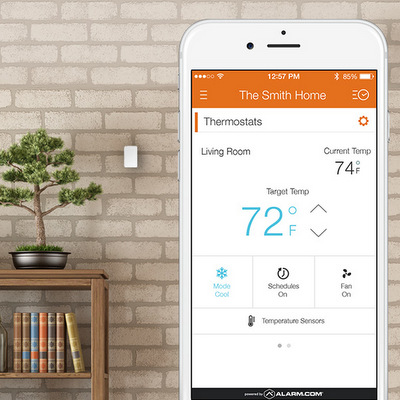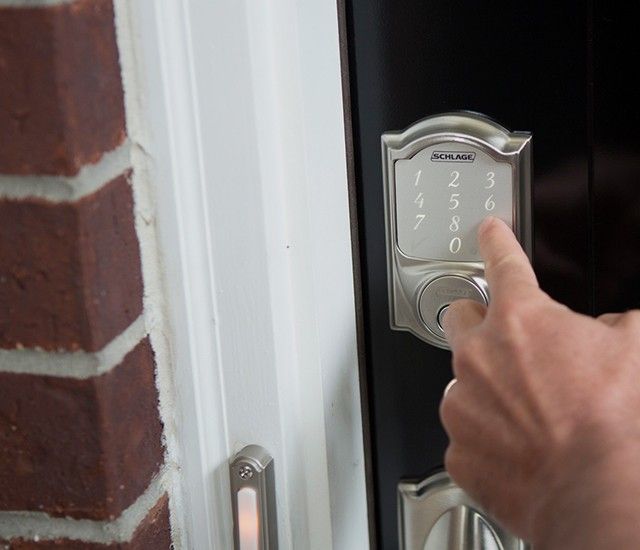Spring break is here, and summer is following closely. Peak vacation season is right around the corner. Not coincidentally, peak burglary season will begin exactly when vacation season starts up. The U.S. Department of Justice details various trends in home burglaries in this report, and a quick glance shows a strong correlation between burglaries and the arrival of summer. Warm weather and empty houses during family vacations both help keep this trend consistent year to year. Therefore, consider taking some extra vacation security measures to prevent becoming a statistic. Many of our security system customers ask us what they steps they should take to make sure things run smoothly while they are away. In this post, we will look at some security system best practices for optimizing your home’s security during vacation.
Update Your Security System Contact List
We always encourage our customers to apply this vacation security tip. In an actual burglary or fire emergency, every second counts. A lot of wasted time goes by when a central station’s first several calls go unanswered. Imagine waking up in a different time zone to see that several people in your vacation party have missed a call from the central station. Unfortunately, we have had several customers experience this exact scenario. Even if someone does pick up the phone, they will not be in a position to stop by a house during an alarm event. Ideally, the central station can quickly reach a friend of family member who is in a position to check on a situation in a timely manner.
The first several central station contacts are often family members, at least some of whom are likely vacationing with you. Consider creating a new contact list for your vacation. We can alert the central station to the new list, along with the dates of your trip. When you get back, you will not need to take any additional steps to “reset” the contact list. Simply let us know who the central station should call while you are gone, and when you will return.
Set Your Home Temperature Schedule Mindfully

A smart thermostat, such as this one by Alarm.com, allows you to adjust your home’s temperature remotely, or set up a money-saving vacation temperature schedule.
In our post “7 Important Security System Add-Ons for Your Smart Home,” we detailed how setting a smart thermostat temperature schedule can save you money. However, many of our customers fail to change this schedule while on vacation. You may have your smart thermostat set to follow your usual activity schedules. Usually, this method efficiently adjusts the home temperature based on when you are generally home. Or, perhaps you’ve created your own temperature schedule based on your regular work hours and usual household activity. In either case, remember that your thermostat will raise the temperature automatically at specific pre-set times.
You can set your vacation temperature schedule a couple different ways. One option is simply choosing a temperature for your home that remains consistent over your vacation. If desired, you can also program the house to start warming up for you a few hours before you return. However, perhaps you plan on letting people stay in your house for a period of time while you are away. In this case, you may not want to keep the temperature too low for comfort.
If you have a security system with an interactive cellular dialer, such as ours powered by Alarm.com, you can set your temperature based on your security system status. For example, you can set your home temperature at 72 degrees when the system is disarmed, but only 60 degrees when the system is armed. Now when your house guests leave and arm the system, the temperature drops back to a level that won’t leave you coming home to an inflated heating bill. In addition, you will also receive an alert if your home temperature dips below a specific, customizable temperature range. This can alert you to a potential frozen pipe or other situation in time to avoid a disaster, greatly increasing both your security and peace of mind.
Let Sitters Into Your Home Without Giving Out Keys
Leaving spare keys outside or handing keys out always comes with some danger. While on vacation, this danger increases dramatically. Perhaps you take great care to track how many keys you make and where they go. Unfortunately, this does nothing to stop people with keys from copying them. We offer a solution for this issue. A keypad lock allows people into your home without the use of a key. You can also create and delete codes at any time. Rather than giving out the code that you use to enter your own home, adding a temporary code ensures that your sitters do not have permanent access to your home.

A smart keypad deadbolt, such as this lock by Schlage, allows for both keypad-based entry and remote operation through a smart phone.
Taking this security measure one step further, consider installing a smart deadbolt that you can lock and unlock remotely. Perhaps you would prefer to let someone into your house without giving them a code. A smart lock allows you to do just that. Simply use your phone to unlock your door, and you will receive an alert when the door is locked again. You can even set a schedule to receive a notification if nobody locks the door by a certain time. If you know that someone will water your plants between 12-2, for example, a 2:15 notification that your door is still unlocked can be quite helpful. Of course, in addition to receiving a notification, you can then use your phone to lock the door.
Some smart locks, such as the Schlage Sense lock pictured, combine the best of both options. A keypad smart lock allows you the option of giving out codes or unlocking the door remotely for sitters. You can still provide codes for those you trust to enter the house on a regular basis. However, perhaps you only wish to grant a contractor or cleaning service quick access to the home for only one day. This option allows you tremendous security and flexibility.
Add New Alarm Codes
If you do allow people into your home during vacation, consider adding temporary alarm codes. The more people that have your alarm code, the more likely it is that someone will use that code to break in at some point. You can add an additional, temporary code to grant temporary access for sitters and workers that you delete upon returning from vacation. This is much safer than giving your personal alarm code out to others. Taking this concept one step further, you could even add a separate code for each individual who might need to gain entry into your home. This allows you to individually control others’ access to your home rather than having a generic “visitor” code in addition to your own security code.

Adding unique alarm codes for different users allows you to receive personalized Alarm.com alerts on your phone.
Adding multiple alarm codes also comes with another added benefit. If guests each have their own alarm code, you can use your Alarm.com app to track who arms and disarms your system, and when. Receiving an instant notification that alerts you when someone disarms your system tremendously lessens the risk of being robbed by someone who has an alarm code. If someone does enter you home when you did not expect them to, you can even use your phone to remotely activate the alarm and create a siren and police response from your security system.
Get Creative with Smart Appliance Schedules
People often put lights on timers to create the illusion of an occupied house. Unfortunately, lights that turn on and off at exactly the same time do little to convince potential burglars. You can use a smart plug to turn any device into a smart home appliance that you can control remotely with your phone. This ability can add a measure of vacation security by allowing you to truly make your house appear occupied.
While away from the house, you have a couple different options to control your smart appliances. You can set a manual schedule for your lights that varies every day. For example, you can program your lights to turn on at 4pm Monday. Then Tuesday you can have your lights turn on at 5pm, set up a noon schedule for Wednesday, and so on. You can also randomize your light and smart appliance schedule. This turns lights and any smart appliances you wish on and off at random times.
In addition to lights, get creative with which devices you use to plug into your smart plug. Consider turning radios, television simulator lights, or other devices on at various times while away. The more activity that occurs while you are out of the house, and the less predictable the activity is, the better.
Putting it All Together
After reading this post, you should have some specific vacation security ideas. However, perhaps you have some questions about how to put them into place. Whether you spend large parts of the year away from home or simply make the occasional weekend getaway, you leave your home vulnerable when on vacation. If you have any questions about these tips or have any other vacation security concerns, please do not hesitate to contact us. We will work with you to ensure your home’s security and your own peace of mind during your travels.
